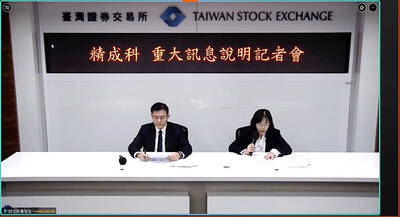A major umbrella union has joined a protest by South Korean truckers, broadening a work stoppage that is disrupting global supply chains and hitting local exporters.
The Korean Confederation of Trade Unions is today staging demonstrations at 16 places to support striking truck drivers, it said on its Web site.
The union, which has about 1 million members, including metal workers in autos, shipbuilding and chip industries, did not disclose how many participants would be at the protests.

Photo: Reuters
BETTER COMPENSATION
Calling for better wage systems since Nov. 24, the truckers’ strike is straining supply chains at South Korean exporters as they are blocking ports and entrances of plants.
The government has issued orders in an attempt to force drivers in key industries to return to work, but just 25 percent of container shipments recovered to the normal levels as of 5pm on Sunday, the South Korean Ministry of Oceans and Fisheries said.
From yesterday, the South Korean Ministry of Trade, Industry and Energy started asking shippers and cargo owners whether their truck drivers are following the government’s orders, the ministry said in a statement on Sunday night.
The truckers’ union said it would continue the protests, blaming the government for “violently cracking down on strikes.”
South Korean President Yoon Suk-yeol’s approval rating rose for the second week amid his hard-line stance on the strike, a survey from Realmeter showed.
Yoon compared the truckers’ strike to “a threat like North Korea’s nuclear activities,” Yonhap News Agency reported, citing a recent meeting between the president and top officials.

SEMICONDUCTORS: The firm has already completed one fab, which is to begin mass producing 2-nanomater chips next year, while two others are under construction Taiwan Semiconductor Manufacturing Co (TSMC, 台積電), the world’s largest contract chipmaker, plans to begin construction of its fourth and fifth wafer fabs in Kaohsiung next year, targeting the development of high-end processes. The two facilities — P4 and P5 — are part of TSMC’s production expansion program, which aims to build five fabs in Kaohsiung. TSMC facility division vice president Arthur Chuang (莊子壽) on Thursday said that the five facilities are expected to create 8,000 jobs. To respond to the fast-changing global semiconductor industry and escalating international competition, TSMC said it has to keep growing by expanding its production footprints. The P4 and P5

Printed circuit board (PCB) maker Global Brands Manufacture Ltd (精成科技) is to fully acquire Japanese peer Lincstech Co for about NT$8.4 billion (US$256.9 million) as the company aims to add high-end PCBs to its PC-centric product lineups. The company also expects the deal to help expand its manufacturing sites in Southeast Asia, as local firms diversify to mitigate geopolitical risks. “The acquisition will mean an important step for the company to further expand its presence in Southeast Asia and globally,” Global Brands Manufacture chief financial officer Weng Chia-yu (翁家玉) said at a news conference in Taipei yesterday. The company has set up manufacturing

DOWNFALL: The Singapore-based oil magnate Lim Oon Kuin was accused of hiding US$800 million in losses and leaving 20 banks with substantial liabilities Former tycoon Lim Oon Kuin (林恩強) has been declared bankrupt in Singapore, following the collapse of his oil trading empire. The name of the founder of Hin Leong Trading Pte Ltd (興隆貿易) and his children Lim Huey Ching (林慧清) and Lim Chee Meng (林志朋) were listed as having been issued a bankruptcy order on Dec. 19, the government gazette showed. The younger Lims were directors at the company. Leow Quek Shiong and Seah Roh Lin of BDO Advisory Pte Ltd are the trustees, according to the gazette. At its peak, Hin Leong traded a range of oil products, made lubricants and operated loading

The growing popularity of Chinese sport utility vehicles and pickup trucks has shaken up Mexico’s luxury car market, hitting sales of traditionally dominant brands such as Mercedes-Benz and BMW. Mexicans are increasingly switching from traditionally dominant sedans to Chinese vehicles due to a combination of comfort, technology and price, industry experts say. It is no small feat in a country home to factories of foreign brands such as Audi and BMW, and where until a few years ago imported Chinese cars were stigmatized, as in other parts of the world. The high-end segment of the market registered a sales drop